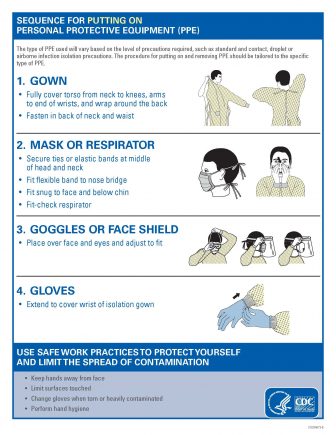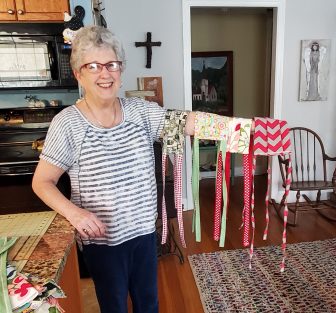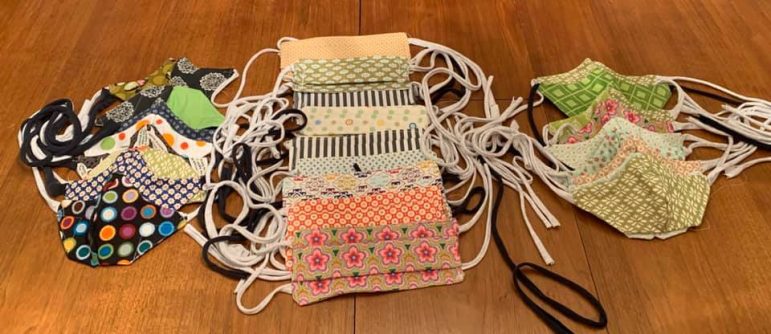‘Critical Shortage Everywhere’ Of Personal Protective Equipment
Like a lot of places these days, the Homewood Public Library is closed. But on Saturday, Dr. Theresa Northern was sitting out front with large cardboard boxes, awaiting donations of Personal Protective Equipment, or PPE.
Northern is part of a Birmingham group for physician moms, which has organized donation drives the past two weekends.
“We’ve gotten a lot of gloves and some masks as well,” Northern says.
The group is specifically requesting N95 masks, or respirators, which have special filters that can help protect against the coronavirus. Other types of PPE include face shields and isolation gowns.
A Critical Shortage
Northern, who is a physician at UAB Hospital, says there is a growing need for this kind of clothing, especially for the medical providers and emergency responders who are directly interacting with patients suspected or confirmed to have COVID-19. The problem is that there is not enough of it. 
“It is a critical shortage everywhere,” says Julie Cobb, with Jefferson County’s Emergency Preparedness and Response Division.
Officials with UAB Hospital say they have been short on PPE for weeks. And Cobb says it is the same for rural providers and smaller hospitals like East Alabama Medical Center, where five deaths due to COVID-19 were reported this weekend.
The supply shortage is two-fold, caused by both an increase in global demand for these products and a delay in production due to the spread of the coronavirus.
Jefferson County started collecting PPE donations last week at the Christian Service Mission, but Cobb says they have not collected many items.
“It has not been very successful because there are just not a lot of entities with this type of PPE,” she says.
The Jefferson Co Dept of Health & Christian Service Mission will begin accepting home-made face masks & gowns to be used by local health care workers, first responders & others on the front lines of the COVID-19 response, beginning Friday, March 27, 2020. https://t.co/JVzDSvdLM0 pic.twitter.com/hsxHdgUp0w
— JCDH (@jcdhtweets) March 26, 2020
Cobb says medical providers are trying to conserve the supplies they have left. She says hospitals are now treating N95 masks like controlled substance drugs, kept on a shelf and requiring a two-person sign off. Providers are also re-using supplies when possible. They’re also reserving high level protective gear for the workers at highest risk of contracting COVID-19.
Cobb says they are searching for alternatives.
“It’s literally just like, you know we’re so used to doing everything on a computer and doing all of our charting and doing electronic medical records,” she says. “Well this is like, all the power’s gone and we’re having to go back to a pencil and piece of paper.”
Plan B
Cobb says new manufacturers are starting to make PPE and there is a national effort to increase supply. And in recent days, a growing number of community members have dusted off their sewing machines to stitch up handmade cloth masks.

Elizabeth Sulprizio Wilson
Elizabeth Sulprizio Wilson and her mother are sewing masks everyday.
Over 4,000 people have joined the Facebook group Bham Face Masks. The grassroots group says it has received and filled thousands of requests from local clinics, hospitals and shelters. Birmingham-based wedding dress designer Heidi Elnora has also started designing and making masks.

Suzanne Oliver Avery
Masks made by Suzanne Oliver Avery
Most of these homemade masks are made of cotton and elastic and some include a filter. They do not replace the N95 masks, but they offer at least some level of protection for people who are not on the front lines.
Northern, with the physician moms group, says the cloth masks are not ideal. But she says the coronavirus is forcing everyone, including health care providers, to adapt.
“It changes the way you operate,” she says. “Because you have to sort of, you’re thinking both about what is the right thing to do, and what can we do.”
Northern says one thing everyone can do is help lessen the demand for these products by staying home as much as possible.
Trump announces ‘major combat operations’ in Iran
Israel and the U.S. have launched strikes against Iran, with explosions reported in Tehran and air raid sirens sounding across Israel.
Trump says he is ‘not happy’ with the Iran nuclear talks but indicates he’ll give them more time
U.S. President Donald Trump said Friday he's "not happy" with the latest talks over Iran's nuclear program but indicated he would give negotiators more time to reach a deal to avert another war in the Middle East.
Bill Clinton says he ‘did nothing wrong’ with Epstein as he faced grilling over their relationship
Former President Bill Clinton told members of Congress on Friday that he "did nothing wrong" in his relationship with Jeffrey Epstein and saw no signs of Epstein's sexual abuse as he faced hours of grilling from lawmakers over his connections to the disgraced financier from more than two decades ago.
Pentagon puts Scouts ‘on notice’ over DEI and girl-centered policies
After threatening to sever ties with the organization formerly known as the Boy Scouts, Defense Secretary Hegseth announced a 6-month reprieve
President Trump bans Anthropic from use in government systems
Trump called the AI lab a "RADICAL LEFT, WOKE COMPANY" in a social media post. The Pentagon also ordered all military contractors to stop doing business with Anthropic.
HUD proposes time limits and work requirements for rental aid
The rule would allow housing agencies and landlords to impose such requirements "to encourage self-sufficiency." Critics say most who can work already do, but their wages are low.







